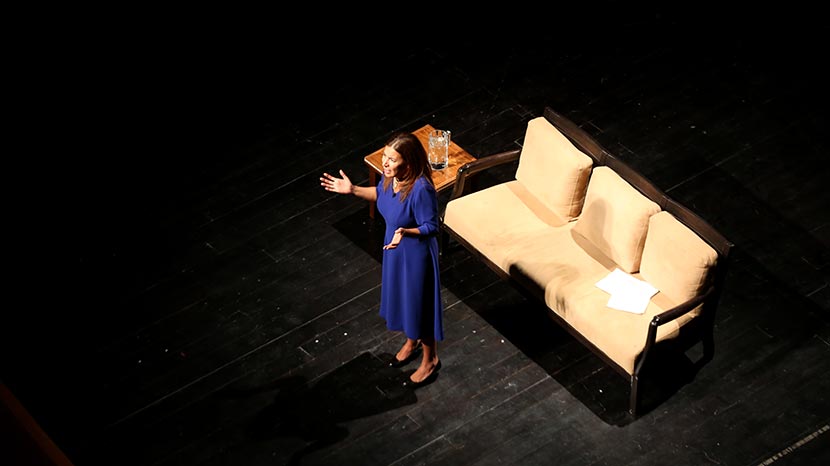One- Woman Show Brings Back Palestine's Revolution
In her dark blue dress that goes slightly below the knees, taking different positions on a couch, or abruptly standing up to dance a revolutionary dabke, Raeda Taha speaks out, on the wide stage of Birzeit's Nasib Aziz Shaheen Theatre, the story of many Palestinian families who are in a frequent clash between the public celebration of those who die fighting the Israeli occupation, and the private suffering of those they leave behind.
Partnering with the Lebanese director Lina Abyad, Taha, the daughter of martyr Ali Taha, is the real surprise in this monodrama "Where can I find someone like you, Ali?" Switching accents and postures, she embodied different characters and recounted tales from her story.
Raeda Taha wrote a rich historical narrative, and told with her poetic undertones, mixing tragedy with humor, switching dialects, and imitating characters with small details, the story of her father- Ali Taha, who was one of four freedom fighters who hijacked a Belgian airline on its way to Al Lud airport in 1972, seeking to swap its passengers for Palestinians imprisoned by the Israelis.
Moving between narration and acting, Taha took the audience back in time to an important period of the Palestinian's struggle against occupation. The play was distinguished with its humanitarian sense that recalls the memories of a child that was forcibly been pulled away from her ordinary right, living an open-ended fatherlessness in the name of the Palestinian cause.
The actor and director challenged the traditional approaches in Arab theatrical performance. The story of revolutionaries who sacrificed for Palestine, and the fate of their loved ones were gathered in a one show, one woman and one story.
Performing her monologue based on a series of tender and harsh moments, “Where can I find someone like you, Ali” is indeed a rare moment in the history Arab and Palestinian theater, and a great reflection of the Palestinian Identity.
The Story of Ali Taha
On the evening of May 8, 1972, a Boeing 707 operated by the Belgium national airline Sabena landed at the Lod Airport. Its pilot informed the control tower that it is under the control of militants. It was the William Nassar group whose members chose to take Sabena flight 571 flying from Brussels to the Lod Airport in occupied Palestine to take on the enemy on its own turf. It had four freedom fighters, two men and two women from the Black September organization who demanded the release of a hundred prisoners in Israeli jails in return for the hostages. They fell into a trap when they accepted the request of the Red Cross to extend the ultimatum and continue to negotiate allowing to bring more food on the plane. Israeli commandos led by Benjamin Netanyahu stormed the plane. Taha and Abdel Raouf al-Atrash were martyred while Terese Halsa and Rima Issa were captured (they were later released in a prisoner exchange operation in 1982). Thus the Lod Airport (later Ben Gurion International Airport) operation failed. It was said that Ali Hassan Salameh (who would later be martyred) planned it.







